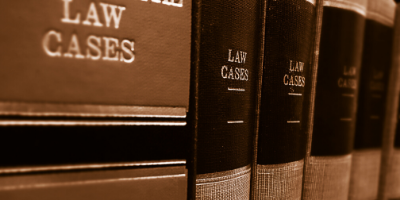Quarterly Journal 47-3
In This Section
The AIPLA Quarterly Journal, a publication of the American Intellectual Property Law Association, is housed at the George Washington University Law School and is edited and managed by an Editorial Board of intellectual property experts and a staff of law students under the direction of the Editor-in-Chief, Professor Joan Schaffner.
The Quarterly Journal is dedicated to presenting materials relating to intellectual property matters and is published four times per year. Editorial Board members (all of whom are lawyers) are selected based upon demonstrated interest and experience, and student staff members are selected from the students of the GWU Law School.
 QJ 47.3 - Patent Eligibility of Inventions Directed to Graphical User Interfaces
QJ 47.3 - Patent Eligibility of Inventions Directed to Graphical User Interfaces
Malgorzata Kulczycka
The 2019 Guidance provides some clarity for determining patent eligible subject matter under § 101. For example, it clarifies that to be patent eligible, a claim needs to state a new and practical application of an alleged abstract idea.
As the USPTO continues to apply the 2019 Revised Guidance, the number of rejections under § 101 issued in patent applications directed to graphical user interfaces should continue to decline.
This article discusses several recent patent cases in which the inventions were directed to graphical user interfaces. In each of those cases, an applicant would have had a chance to advance their arguments against the § 101 rejections by showing how the recited graphical user interface integrates the alleged abstract idea into a practical application.
 QJ 47.3 - The “Unwilling Licensee” in the Context of Standards Essential Patent Licensing Negotiations
QJ 47.3 - The “Unwilling Licensee” in the Context of Standards Essential Patent Licensing Negotiations
Andre Schevciw
This article proposes a framework to determine whether an implementer of standards-essential patents (“SEPs”) is an “unwilling licensee” of fair, reasonable, and non-discriminatory (“FRAND”) licensing terms.
In recent years, scholars and courts have discussed extensively the potential for SEP holders to engage in “patent hold-up.” As a result, SEP holders are now mostly blocked from seeking injunctions, with a possible exception when the SEP implementer is an “unwilling licensee” of FRAND terms.
The SEP holder’s difficulty in seeking an injunction, the uncertainty in determining FRAND rates, and a lack of an agreed definition for “unwilling licensee” create the risk for the so-called “patent hold-out” problem. This article focuses on the “unwilling licensee” determination problem and proposes a framework based on a step-by-step, objective fact-based analysis. The framework aims to increase predictability for both SEP holders and SEP implementers.
 QJ 47.3 - Artificial Human Life: Patentable, Playing God, Both?
QJ 47.3 - Artificial Human Life: Patentable, Playing God, Both?
Austin Grossfeld
We as a species have been trying to learn how and why we do the things we do for hundreds of years. This curiosity resulted in scientists at the University of Cambridge making a revolutionary breakthrough by artificially creating an embryo in a laboratory setting.
However, with great discoveries come many questions. One of these questions is whether or not these scientists can patent their work. Attaining the answer to this question requires the analysis of decades of judicial, legislative, and agency decision-making.
This Note looks at the history of all three of these branches that factor into patent rights and requirements, while trying to narrow down the applicable precedent.
 QJ 47.3 - Music to My Ears: Adding a Fair Use-Like Provision to the Anti-Bootlegging Statutes
QJ 47.3 - Music to My Ears: Adding a Fair Use-Like Provision to the Anti-Bootlegging Statutes
Sean Hanlon
The federal anti-bootlegging statutes protect live musical performances from unauthorized use. The statutes were conceived in good faith, but have flaws and ambiguities that may impede their effectiveness. The main issues with the statutes are their conflicts with the First Amendment and Commerce Clause. While the statutes have survived challenges regarding the Commerce Clause, they remain vulnerable to First Amendment scrutiny because they lack a fair use exception.
This note delves into the existence and possible resolutions to these problems using social media and modern recording technology as possible bootlegging tools. It is imperative to make these changes as soon as possible considering the Beijing Audiovisual Treaty may further expand the copyright landscape to protect more forms of audiovisual works.
This Note suggests that the federal anti-bootlegging statutes be amended to add a fair use-like exception that may balance performers' rights with users' rights. In reaching this conclusion, this Note describes the digitization of recording technology, provides a comprehensive look into the anti-bootlegging statutes and their legislative history, and discusses copyright and anti-bootlegging cases addressing fair use and the First Amendment. Finally, this Note provides an example of how the anti-bootlegging statutes can be amended to prevent future problems.
 QJ 47.3 - Product Hopping Analysis: A More Beneficial Approach
QJ 47.3 - Product Hopping Analysis: A More Beneficial Approach
Divesh Patel
Product hopping in the pharmaceutical industry has become more prevalent over recent years, and courts have had varying responses to address this behavior. By focusing on a traditional antitrust analysis for the pharmaceutical industry, which is not a well-functioning market, courts have reached inconsistent decisions that do not necessarily punish the market exploiter and reward the honest competitor.
This Note looks to the drug approval process in the European Union, specifically Germany, and proposes a new standard that focuses on additional clinical benefits. Although courts do not typically assess the value of parties’ innovations, the pharmaceutical field is unique in its relationship between competitors and consumer, and thus warrants a new approach to address these issues.
By focusing on the clinical benefits of new formulations, courts can better encourage valuable innovation by branded drug companies and protect the market from trivial advancements made solely for the purpose of excluding generic companies from the market.
Upcoming Events
-
.png?sfvrsn=48c235e_1) 2026 Patent Prosecution Bootcamp - Arlington, VA
2026 Patent Prosecution Bootcamp - Arlington, VA
March 4 to 6, 2026 | Up to 1235 minutes, including 60 Ethics minutes
-
 AIPLA CLE Webinar: Damages 2025 Year-in-Review: Lessons and Litigation Strategies
AIPLA CLE Webinar: Damages 2025 Year-in-Review: Lessons and Litigation Strategies
March 11, 2026 2:00 PM to 3:30 PM | Eligible for up to 90 Mins CLE
-
.png?sfvrsn=20d96f46_1) AIPLA LinkedIn Live: What the 2025 AIPLA Economic Survey Reveals About IP Practice Today
AIPLA LinkedIn Live: What the 2025 AIPLA Economic Survey Reveals About IP Practice Today
March 12, 2026 12:00 PM to 12:45 PM
-
2026 Women in IP Global Networking Event
April 16, 2026
The annual Global Networking Event connects intellectual property practitioners from around the world for a day of networking, education, and creating meaningful connections. This year’s theme, Rooted in Real - Women in IP Redefining the Narrative, is an opportunity for the AIPLA Women in IP Law Committee to celebrate authentic experiences, foster genuine connections, and showcase the real stories of women shaping the field of intellectual property law. -
-(1).png?sfvrsn=169c8b82_1) Careers in IP
Careers in IP
April 22, 2026 12:30 PM to 1:30 PM | No CLE

